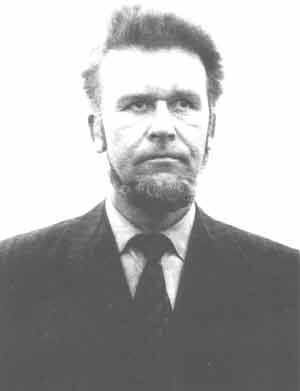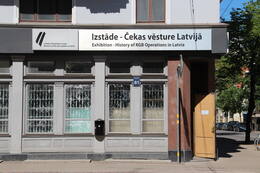Gunārs Astra (1931-1988) IV Soviet Occupation
Gunārs Astra (born on October 22, 1931 in Rīga, died on April 6, 1988 in Leningrad) was a Latvian freedom fighter and a prominent Soviet dissident. After graduating from the Riga Electromechanical Technical School in 1952, he started working at the VEF factory, where his career as a radio engineer began. In 1958, Mr Astra met US diplomats, and that meeting changed his life. In 1961, Gunārs Astra was accused of espionage, treason and anti-Soviet agitation and propaganda. He was sentenced to 15 years in prison and confiscated. Astra served his sentence in the Mordovian SSR and Perm region. During his imprisonment, Astra engaged in self-education, got acquainted with other political prisoners of Latvia and other nationalities. After serving his sentence, Gunārs Astra returned to Latvia. When he returned to freedom in 1976, Astra did not give up. In 1983, he was arrested for the second time and tried for storing, reproducing and distributing "anti-Soviet" literature. As a recidivist, he was sentenced to seven years in a special regime colony and five years in a camp. He said his "Last Word" in court on December 15, 1983, concluding: "I believe this time will fade like an evil nightmare. It gives me the strength to stand here and breathe. Our people have suffered a lot and have learned and will continue to endure this dark time. ” Astra was sentenced in the Perm region.
On February 1, 1988, Gunārs Astra was released from prison, but on April 6 of the same year, he died in a hospital in Leningrad, possibly poisoned by a member of the USSR State Security Committee.
On April 19, Gunārs Astra was buried in Rīga, II Meža cemetery. The funeral was reported by Radio Free Europe and the Voice of America and everyone was invited to attend. The gathered people (about 10 thousand people) filled his grave with his hands.
On October 22, 1991, a monument dedicated to Gunārs Astra, dedicated to the artist Raimonds Muzikants and architect Pēteris Štokmanis, was consecrated in the Forest Cemetery. In 1993, on the 75th anniversary of the State of Latvia, a memorial plaque dedicated to Gunārs Astra was erected at the Riga Regional Court building at 34 Brīvības Street. A street in Riga is named after him.
More information sources
Gunārs Astra. Wikipedia. https://en.wikipedia.org/wiki/Gun%C4%81rs_Astra
Biruta Eglīte. Who were you, Gunar Astra? Riga, 1998.
Maris Ruks. Gunārs Astra. Riga, 1998.
Trials against Gunārs Astra. Virtual exhibition. Latvian State Archives, 2013: http://www.archiv.org.lv/astra/
Related objects
Exhibition in the KGB Building "History of KGB Operations in Latvia"
The former USSR State Security Committee (commonly known as Cheka) building is open for visitors. Here chekists imprisoned, interrogated and murdered Latvian citizens who were considered opponents by the occupation regime. There is also an exhibit from the Latvian Occupation Museum on the activities of Cheka in Latvia. Guided tours of the prison cells, corridors, basement and courtyard are available. The house was built in 1911 and it is one of the most beautiful buildings in Riga. Called the ‘Corner House’ by the people, it was the scariest symbol of the Soviet occupation regime in Latvia, and also one of the pillars of power of the USSR. Cheka operated from the Corner House during the occupation from 1940 to 1941 and then again from 1945 to 1991. Tens of thousands of Latvians were affected by direct political persecution. The fight against enemies of Soviet rule continued also after World War II. Cheka’s approach towards its operation slightly changed after Stalin’s death. Physical torture was replaced by psychological terror. The majority of Cheka agents were Latvians (52%). Russians were the second largest group – 23.7%. 60.3% of the agents were not members of the Communist Party. 26.9% of the agents had higher education. The system was designed in a way to involve local people and thus have greater control over the society. Staff documents and service records are located in Russia. And these materials have not been made available to Latvian authorities and researchers.






